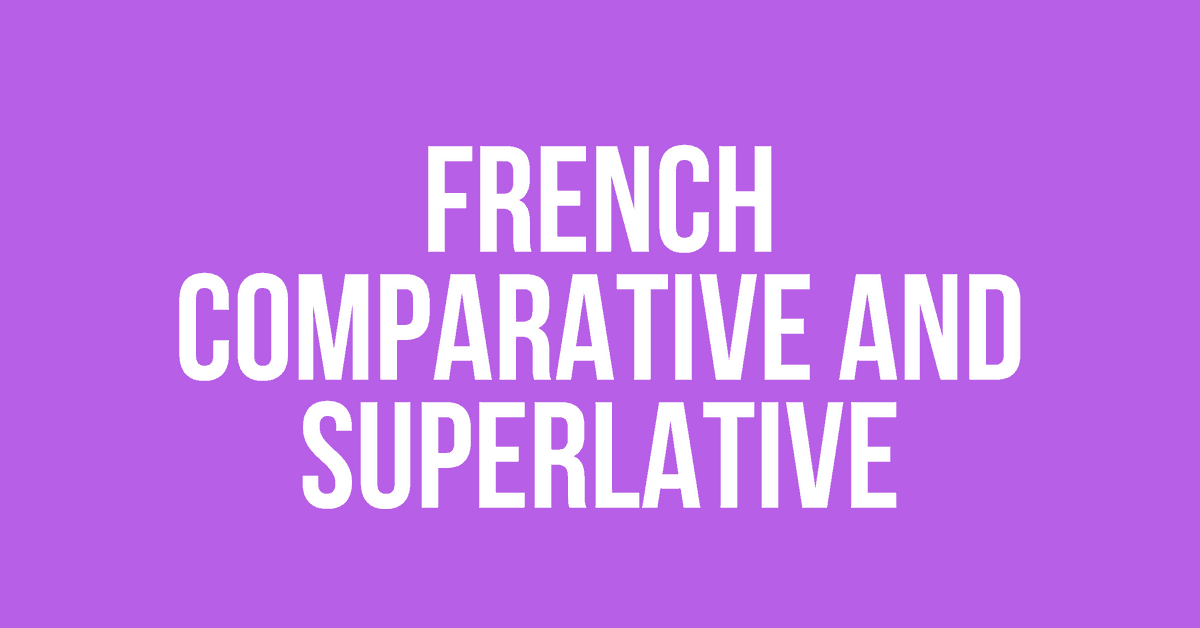Reading time: 5 minutes
Difficulty: Beginner/ Intermediate
Comparing people, objects or actions is not only useful in conversations, it could be fun too! Like, how will you say this without the help of comparatives and superlatives?
”I am more good-looking than my co-workers. In fact, I'm the most good-looking person in our workplace!”
That's right. You can't!
In grammar, we use comparatives to compare superiority, inferiority, or equality between two or more things (I am more good-looking than my co-workers). For the superlatives, we use it to talk about the extremes (I am the most good-looking person ever!)
French comparatives and superlatives, just like in English, can occur both in adjectives and adverbs. For this lesson, we've divided the topic into two: adjectives and adverbs. I suggest that before you dive into this topic, you should do a quick review of the adjectives and adverbs first.

PART 1. Comparatives and Superlatives of Adjectives
Before we talk about the French comparatives and superlatives, let's do a quick review of what it means in the English language, and let's work our way from there.
- Comparative adjectives: These are adjectives that usually end in -er or has the word 'more' or 'less' before it.
For single or double syllable words, we usually just add -er at the end of the word, with a few variations in spelling. Examples: lovelier, cuter, slower or bigger.
For longer words with three syllables or more, we put more or less before the noun. Examples: more important, less beautiful, more enticing, less submissive.
- Superlative adjectives: These are adjectives that end with the suffix -est or has the word most or least before it.
The rule on when to use -est or most and least is the same as that of the comparative adjectives. Examples: loveliest, cutest, slowest, biggest, most important, least beautiful, most enticing, least submissive.
Now that we've gotten the English definitions out of the way, let's move on to French. Here are some tips and rules in using comparative adjectives:
1. Use the French word plus which means 'more'.
Examples:
Cette question est plus facile. (This question is easier.)
Cette veste est plus chère. (This jacket is more expensive.)
2. Use the word moins which means 'less'.
Examples:
Cette veste est moins chère. (This jacket is less expensive.)
un projet moins compliqué. (a less complicated plan.)
3. Use the word que which means 'than' when introducing the other person or thing you are comparing your subject with.
Examples:
Elle est plus petite que moi. (She's smaller than me.)
Cette question est plus facile que la premiere. (This question is easier than the first one.)
4. Use the word aussi paired with que to say your subject is similar to this other thing. In English, we use this to say, (subject) is as (adjective) as (subject 2).
Examples:
Il est aussi inquiet que moi. (He's as worried as me.)
Cette ville n'est pas aussi grande que Bordeaux. (This town isn't as big as Bordeaux.)
For superlative adjectives, here are the things you should remember:
1. You can use plus to mean 'most' depending on the form of the adjective you're using.
Masculine singular adjectives --- le plus
Feminine singular adjectives --- la plus
Plural adjectives (masculine and feminine) --- les plus
Examples:
le guide le plus utile (the most useful guidebook)
la question la plus facile (the easiest question)
les plus grands hôtels (the biggest hotels)
les plus petites voitures (the smallest cars)
2. You can use moins to mean 'least' depending on the form of the adjective you're using.
Masculine singular adjectives --- le moins
Feminine singular adjectives --- la moins
Plural adjectives (masculine and feminine) --- les moins
Examples:
le guide le moins utile (the least useful guidebook)
la question la moins facile (the least easy or the hardest question)
les mois les moins agréables (the least pleasant months)
les moins belles photos (the least attractive photos)
As always, there are those irregular adjectives that are too hard-headed to conform with the rest. These are the irregular comparative and superlative adjectives.
In English we also have irregulars such as good, better and best. We don't say gooder or goodest, we use better and best. This is the same thing with French. Word such as bon, mauvais and petit don't follow the rules.
Quick tip: Don't forget that comparative and superlative adjectives also need to agree with the noun or pronoun and has to match its gender and quantity. Le, la and les are used to match the superlatives.
A quick recap:
- The words plus and moins are used to denote comparisons just like how we use 'more' and 'less' in English.
- To change an adjective into its superlative form, le/la/les plus or le/la/les moins are used, and these are dependent on the gender and quantity of the subject being described.
- Irregular comparatives and superlatives do not follow these rules
Still Stuck at Intermediate French?

Break through the plateau with our proven coaching and study method.
PART 2. Comparatives and Superlatives of Adverbs
While the adjectives' task is to describe the noun, the adverbs on the other hand, describe the verb.
In English, we use comparatives and superlatives of adverbs to compare two actions, and this works in the same way as the comparisons in adjectives. The comparative adverbs also make use of the suffix -er, and the words more and less. The superlative adverbs likewise have -est endings or the words most and least before it.
Examples in English: slower, faster, earlier, more/less frequently, slowest, fastest, earliest.
Let's discuss further the French comparative and superlative adverbs!
Here are some tips and rules in using comparative adverbs:
- Use plus... que which means more... than. (example: Tu marches plus vite que moi. You walk faster than me.)
- Use moins... que to say less... than. (example: Nous nous voyons moins souvent qu'avant. We see each other less often than before.)
- Use aussi... que to say as...as. (example: Je parle français aussi bien que toi! I can speak French as well as you!)
For superlative adverbs, here are the things you should take note of:
- Superlatives in adverbs work the same way as they do with adjectives, except for one thing: you no longer need to make le agree with the gender or number. In short, there is no la or les for the feminine and plural forms. Le stays as is.
- Use le plus to say the most or the ____est.(example: Michelle parle le plus vite. Michelle speaks the fastest.)
- Use le moins to say the least or the ____est. (example: C'est Cathy qui a mangé le moins. Cathy ate the least.)
Just like the adjectives, here are some irregular comparative and superlative adverbs.
| beaucoup (a lot) | plus (more) | le plus (the most) |
| bien (well) | mieux (better) | le mieux (the best) |
| mal (badly) | pis or plus mal (worse) | le pis or le plus mal (the worst) |
| Peu (little) | moins (less) | le moins (the least) |
A quick recap:
- Comparatives and superlatives of adverbs are formed in the same way as the adjectives. Plus... que, moins... que, and aussi... que for comparatives and le plus and le moins for superlatives.
- Unlike the adjectives, the comparatives and superlatives of the adverbs no longer need to agree with the gender or number of the word they are describing.
Still Stuck at Intermediate French?

Break through the plateau with our proven coaching and study method.
P.S. You would be doing me a HUGE FAVOR by sharing it via Twitter or Facebook.

Bonjour Frédéric. Your instruction is very helpful. How do you ask about someone’s health. “Tu es mieux” or “Tu es meilleur ” ? Merci.
What do you mean by “Tu es mieux” or “Tu es meilleur”. It sounds like you are saying “You are the best”. Can you clarify please?
Are you (feeling) better?
In English, we drop the “feeling” and just ask, “are you better?” also similar to, “is your health better?” But what do the French use?
“Tu vas mieux?”
Merci! J’ai pris un examen ce matin, et je pense que j’ai fait mieux à cause de cette site!